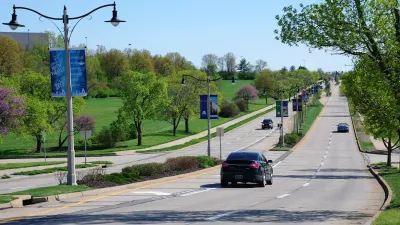Independent Institute research fellow Gabriel Roth advocates for road pricing to relieve traffic congestion but laments when the revenues are not directed to new road capacity but instead applied to public transit.
"Our road systems are like relics of the former Soviet Union: socialist enterprises run by well-intentioned planners with no regard to the pricing and investment criteria that allocate other goods and services. Moscow citizens got relief from food lines by abolishing socialism and embracing capitalism. The market economy could similarly liberate road users from excessive congestion.
If pricing is applied to the scarce resource "road space," and the revenues are allowed to stimulate investment in new capacity - such as additional lanes or new technologies to speed traffic past bottlenecks - congestion could be reduced.
Unfortunately, some government officials and environmental activists embrace road pricing only to the extent that it will restrain the demand for road use, not to increase road capacity. They want government to spend road revenues for other purposes, particularly public transportation.
London's Mayor Ken Livingstone, for example, introduced "congestion pricing" in London in 2003, but surplus revenues are being spent on mass transit. New York Mayor Michael Bloomberg advocates a similar scheme for his city.
How much worse does traffic have to get and how many more bridges have to fail before we abandon our Soviet-style approach to highway transportation and allow road users to get the roads they're willing to pay for? When will we apply to roads the pricing and investment principles on which we rely for electricity, telecommunications, and other necessities?"
Thanks to ABAG-MTC Library
FULL STORY: On Recognizing the Problems: Easing the Bay Area's traffic nightmare

Planetizen Federal Action Tracker
A weekly monitor of how Trump’s orders and actions are impacting planners and planning in America.

USGS Water Science Centers Targeted for Closure
If their work is suspended, states could lose a valuable resource for monitoring, understanding, and managing water resources.

End Human Sacrifices to the Demanding Gods of Automobile Dependency and Sprawl
The U.S. has much higher traffic fatality rates than peer countries due to automobile dependency and sprawl. Better planning can reduce these human sacrifices.

Trump: Federal Government Won’t Pay for California HSR
The President has targeted federal funding for the California bullet train project since his first administration.

San Francisco Enhances Urban Planning Initiatives with Green Infrastructure
San Francisco incorporates green infrastructure in its city development initiatives, elevating the importance of sustainability in urban planning.

Chicago Approves Green Affordable Housing Plan
The Mayor’s plan calls for creating a nonprofit housing corporation tasked with building affordable housing that meets Green Building standards.
Urban Design for Planners 1: Software Tools
This six-course series explores essential urban design concepts using open source software and equips planners with the tools they need to participate fully in the urban design process.
Planning for Universal Design
Learn the tools for implementing Universal Design in planning regulations.
Tyler Technologies
New York City School Construction Authority
Village of Glen Ellyn
Transportation Research & Education Center (TREC) at Portland State University
Chaddick Institute at DePaul University
Institute for Housing and Urban Development Studies (IHS)
Regional Transportation Commission of Southern Nevada
Toledo-Lucas County Plan Commissions


























